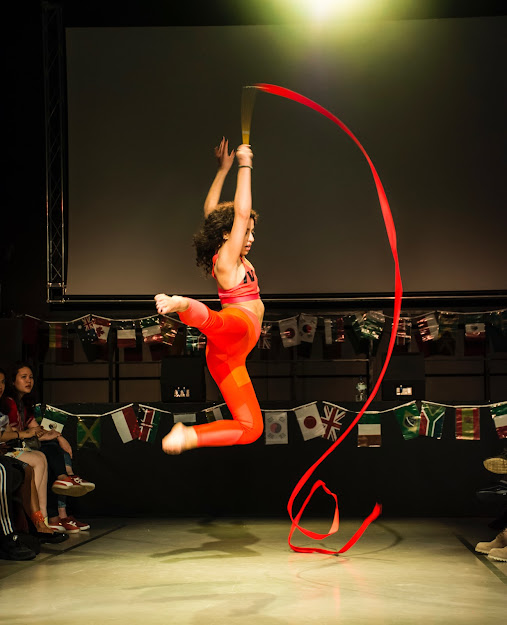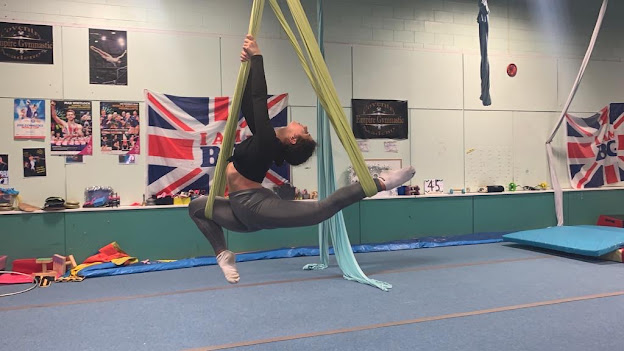INTERVIEW WITH LITO ALEXIOU
Today we had the opportunity to interview Lito Alexiou, half-Greek, half-Australian former rhythmic gymnast, currently living in the
UK, where she has recently completed her degree in Business and Marketing, at
Coventry University. We have decided to expand our horizons and explore not
just a different team sport, but also another geographical area, and learn more
about sports in Europe.
INTERVIEW
Q: How long have you been practising sports?
A: I did rhythmic gymnastics for 15-16
years. When I started university I was a cheerleader for one year, and now I am
doing circus training for the past two years.
Q: What inspired you to start practising rhythmic gymnastics?
A: My parents wanted me to practice a sport,
so they allowed me to try out different ones and decide myself. Rhythmic
gymnastics was the first sport I’ve tried. I really liked it, so I’ve decided
to pursue it.
Q: What did you like most about rhythmic gymnastics?
A: I really enjoy stretching and how
disciplined I have become. Although I am not practising anymore I am still training,
and it really helps me stay healthy and in shape.
Q: What was your main goal as a rhythmic gymnast?
A: When I was young I mainly cared about the
competition - I wanted to be ‘the best’ and an example for everyone. I also
really wanted to travel and do competitions. Now I want to keep on training and
maybe perform again in the future, whether booking jobs to perform or even
music videos for example - I am keeping this option open.
Q: How did you feel before your performances?
A: I felt like everything had to be perfect
- my make-up, my hair, the routine. I was really nervous. Before the
performance we would repeat the routine and stay close to our teammates for
encouragement. Between my team and our competitors’ there was often
body-shaming, subtle fights, and passive-aggression since everything was so
competitive. I am still competitive to this day [laughs].
Q: How did you prepare for performances?
A: Preparation involved a lot of effort,
shouting, and crying. It was very intense and there was a lot of pressure on us
to perform well. We would even get light ‘warning slaps’ if we our posture
wasn’t correct. Normally, before performances we would train from 6 AM, go to
school and back. On weekends we would train 3-5 hours a day. Nowadays I still
train almost daily, although not performing - it relaxes me.
Q: Did you have to follow a specific diet?
A: We had a very strict diet! We could not
eat bread and pastries, souvlaki (traditional Greek food), fast food, canned
foods, chocolate / most sweets, nor drink frizzy or sugary drinks. Red meat and
pasta were only allowed once in a while. Being healthy was extremely important
so we were encouraged to eat fruits and veggies, and drink plenty of water. There
was also quite a lot of body-shaming in order to make us feel bad about our
weight, so we had to be really careful.
Q: Could you please tell us a little about your coach(es)?
A: We had two coaches. Maria Klouvatou,
Greek trainer, well-known for leading big teams like Dias Melission; and Ivo,
her husband, who has joined later on. He is a famous Bulgarian Olympic trainer.
They were very specific. When training us, they wanted us to execute everything
perfectly. One of them was a bit scary sometimes, but it was for our own good.
The other one was more relaxed, but when he did get angry, he would get very,
very, very angry! They were good coaches - very strict, very consistent! I am
grateful for that!
Q: How do you think rhythmic gymnastics has impacted your
daily life?
A: I still don’t eat chocolate for over 11
years since I was not allowed back then [laughs]. Gymnastics has taught me many
things like being punctual, following a strict diet, creativity, leadership,
communications, listening to coaches and being obedient. I became very
disciplined. On top of these, I have also discovered a lot about human nature,
especially how tricky it could be to maintain genuine connections, friendships,
or teamwork in competitive environments because of jealousy, fights, the desire
to ‘be the best’, and so on. But the friends that I did make back then are
friends for life!
Q: What was the biggest seat-back you have faced as a rhythmic
gymnast – a time where you were almost about to quit? How did you overcome it?
A: My parents have stopped me at some point
because the exam season was approaching and I had too much studying to do. I
went back afterwards and some girls from my team were bullying me saying
“You’re letting down the team”, even if I was still in shape and I did not fall
behind. I have continued despite everything.
Q: Nowadays, what do you enjoy doing in your free time?
A: During my free time I like to watch
YouTube videos, create jewellery and marketing content for my business (Instagram:
@_alexioul_), and be consistent
with my training.
Q: What is your perception of gymnastics in Japan and / or
Eastern Asia?
A: I actually did some research into how
they train while I was still practising, with online resources. They focus on
flexibility from really young ages, they seem like ‘little soldiers’. I thought
that their training was too serious, painful, and intense, sometimes even
leading to surgeries and health issues.
Q: Have you got any questions about the sports culture in
Japan, or more generally Eastern Asia?
A: Sure, I have some questions, not limited
to gymnastics only. Do they have a strict diet, or can they indulge more? And, do coaches ever shout at, hit, or pressure their students
till the point where they start crying?
Thank you for you time! If you enjoyed reading this article,
please share your experience with sports, so that we can all expand our
cultural knowledge on this topic.







Really nice photography
ReplyDeleteThanks for reading and the nice comment Abdulz!
DeleteThank you for the helpful post. I found your blog with Google and I will start following. Hope to see new blogs soon.Check it out Delhi Capitals Full IPL 2020 Schedule
ReplyDeleteThanks fo the following and useful info!
Delete